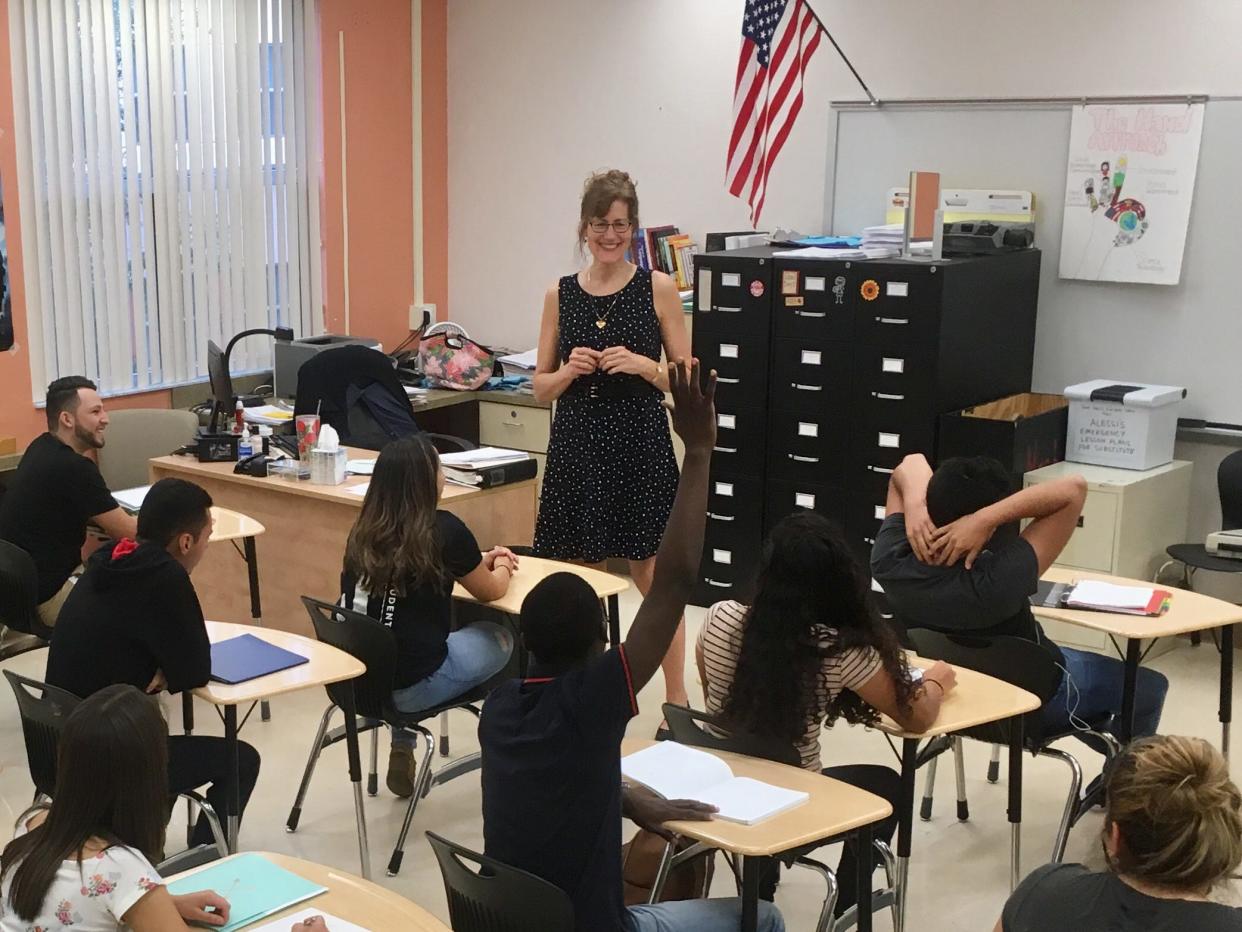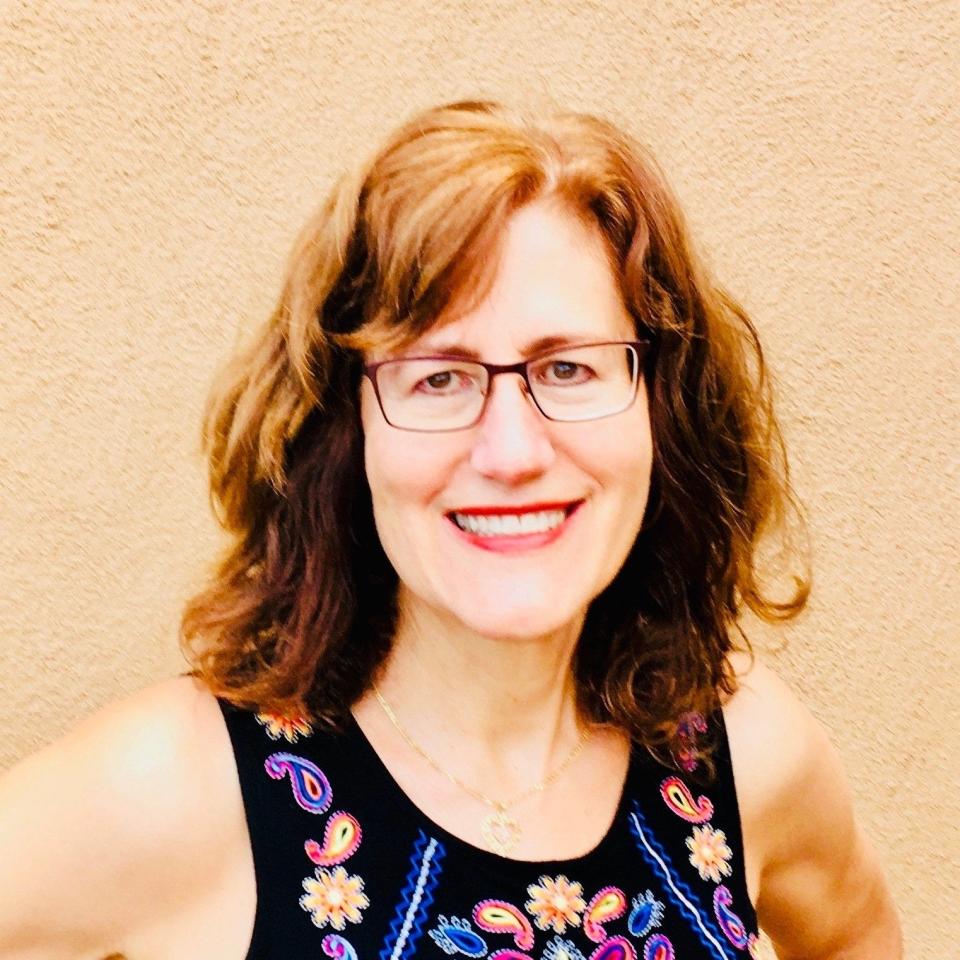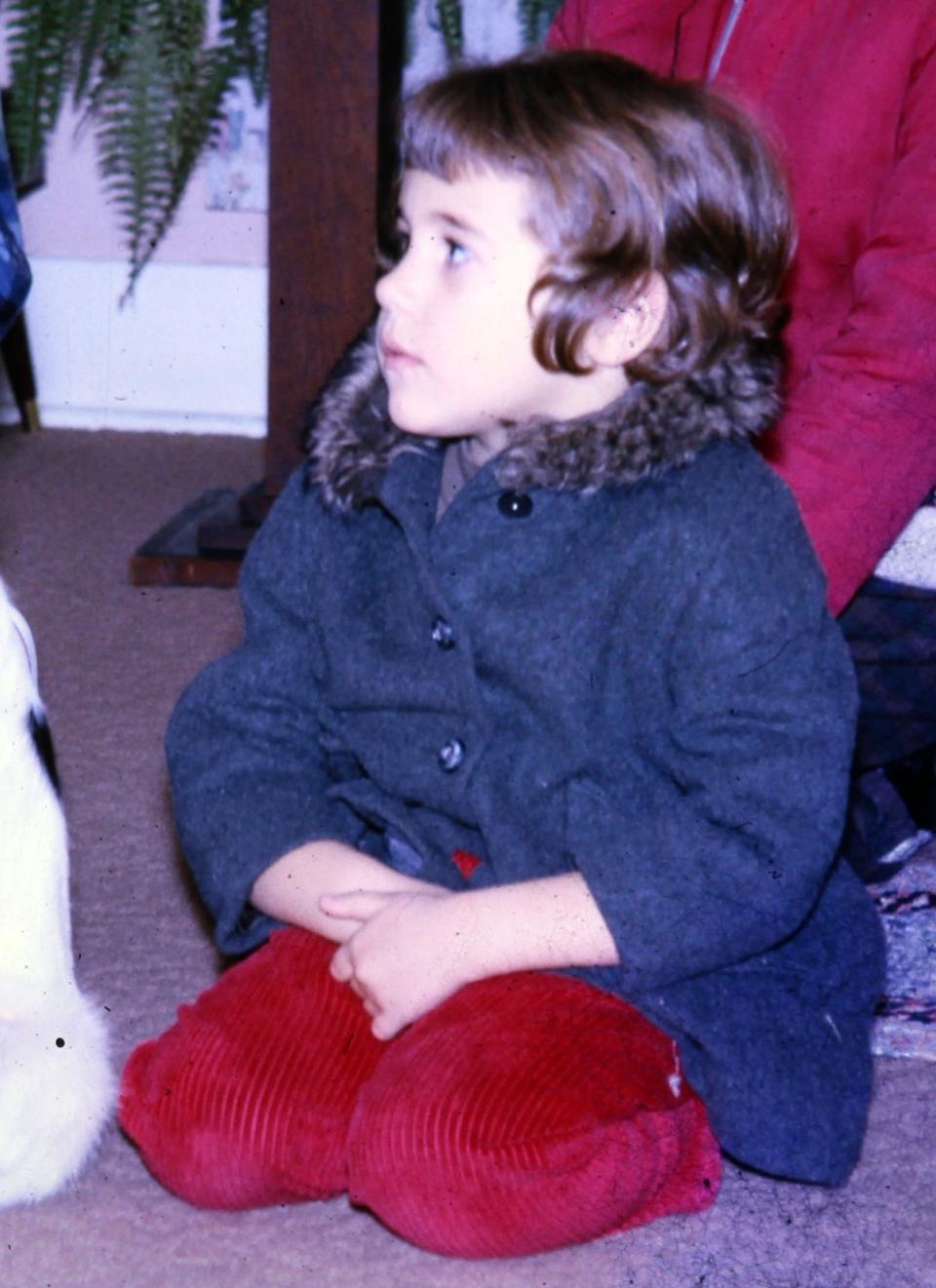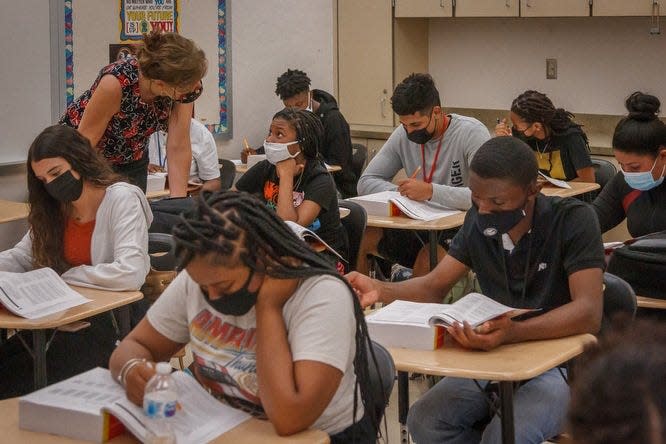Back to School: Palm Beach County teacher finds her voice and helps students find theirs

- Oops!Something went wrong.Please try again later.
My voice trembled my entire first year of teaching.
I’m an English teacher, and it wasn’t that I didn’t know the material or how to deliver a lesson — I trained for that. I longed to do that.
My problem was I'm quiet. I’m shy. And I’m introverted. (No, those three — my “terrible trifecta” — aren’t the same. Stick with me. We’ll get to that.)
At first, I thought I could conquer the trembling with a voice coach. A coach could help me shake the shaking and develop a louder, stronger, less monotone voice.
Not only would I be able to rid my speech of its flaws, but I would also be transformed. I would be more enthusiastic, bubbly, entertaining, energetic, outgoing. You know, all the fun adjectives.
More from Janet: Ignoring my symptoms put my health in serious jeopardy
But no amount of wishing or coaching could change my core personality or remedy my quiet, trembling voice.
No one can blame me, or others like me, for wishing to change.

“In a world which favors the loud and outgoing, quietness can sometimes be perceived as boring or even a weakness,” author Susan Cain says in her book "Quiet: The Power of Introverts in a World that Can’t Stop Talking."
Today, more than ever — just as the squeaky wheel gets the grease — squeaky people get the attention. But those who are quietly helping make the world go 'round deserve our attention, too.
I wanted to make a difference in my students’ lives as my teachers had in mine. But I needed to learn to champion myself in order to champion my students — especially those like me.
Acceptance had to come from within, so I became a student of my disposition.
The 'terrible trifecta'
In "Quiet," Cain distinguishes shyness (“the fear of social disapproval or humiliation”) from introversion (“a preference for environments that are not overstimulating.”) Shyness, she says, “is inherently painful; introversion is not.”
Introverts “prefer to devote their social energies to close friends, colleagues, and family. They listen more than they talk, think before they speak, and often feel as if they express themselves better in writing than in conversation.”
Before reading "Quiet," I may not have understood the differences between being shy, quiet, and introverted, but I’ve always known I was all three.

I never raised my hand, asked questions, or answered them in class. Didn’t comment aloud. Not in elementary, middle, high school or college.
I enjoyed talking to my friends but dreaded having to speak when more than a few people were listening. (Still do, except in my classroom.)
When I was a teen, my dad — who also had the trifecta — saw my discomfort. He was a member of the Toastmasters Club, which “promotes communication, public speaking, and leadership,” and wanted me to join. I refused.
More on Janet and her dad: How I moved from grief and guilt to holiday healing
Whereas most graduates would love to learn that they’re at the top of their class, I was relieved and grateful that a calculating error spared me from giving a speech at my high school graduation. (I was named co-salutatorian afterward.)
When I enrolled in college with the intention of becoming a teacher, my dad gave my phone number to his patients who had quit teaching and asked them to try to talk me out of it.
In 1983, I became a teacher anyway.
Once again, I was spared. Whereas most people must go through an interview (for me, a nerve-wracking, possibly opportunity-obliterating minefield), I was recommended to the principal of John I. Leonard High by his wife, my education professor at Palm Beach Atlantic University. He hired me based on her recommendation and my previous work as a student teacher at his school.
Living your best life: Bucket list: 55 fun must-try things to do in Palm Beach County
A dream job, with nightmares
I had finally made it to the front of the classroom. It was a dream job in many respects. I loved writing lesson plans and creating lessons. And I looked forward to making a difference in my students’ lives, as my teachers had in mine. (And one day, should I become a mom, a teaching schedule would be the perfect fit.)
This school year will be my 41st at JIL, where I’ve taught English, PE, and math. And where I’ve also served as a girls’ basketball and boys’ volleyball coach.
I didn't let a little discomfort stand in the way. Or, as my go-to author on the subject would more eventually advise to the shy, introverted, quiet masses like me: “Figure out what you are meant to contribute to the world and make sure you contribute it. If this requires public speaking or networking or other activities that make you uncomfortable, do them anyway.”
My recurring nightmare that first year of teaching involved girls running half-naked around my classroom and boys snorting drugs on desktops in the back of the room. I’m guessing Freud would interpret this to mean that I was afraid Dad was right — I was too shy to be a good teacher.
Thankfully, that dream didn’t come true.

I’ve also never had to shout down a class full of unruly students. My students — aside from the occasional outlier — treat me with respect. My secret? I treat them with respect (which includes valuing their time in my classroom).
Do I wish I were a charismatic, gifted orator like Martin Luther King Jr.? You bet! But I remind myself and those like me that Rosa Parks, who was eulogized as “timid and shy” and having “quiet fortitude,” played a significant role in history, too.
I wish I would have learned this from Cain years ago: “The trick for introverts is to honor their styles instead of allowing themselves to be swept up by prevailing norms. Don’t think of introversion as something that needs to be cured. Indeed, your biggest challenge may be to fully harness your strengths.”
Knowing that speaking isn’t my forte and that we learn by “doing,” I adopted a style of teaching a concept and then monitoring my students as they apply it. And, thanks to technology, I also use tools such as digital slideshows and CDs of literature read by professional speakers.
Being caring, organized, prepared, creative, knowledgeable, and fair goes a long way, too.
At the end of the school year, I’m surprised and encouraged when students tell me they looked forward to my class, I was their favorite teacher, and/or they learned more from me than any other teacher.
Not blindsided by the downsides
I’ve also learned to weather disapproval and criticism rather than operating in fear of it. That’s helped when it’s come to publishing stories in The Palm Beach Post, which elicit a fair amount of compassion from readers, but a few barbs as well.
(My favorite vitriol includes this great line: “It is incomparably-incredibly-ironic that this illiterate-iterator of this repulsive ridiculousness,” this “high-school English-teacher,” must be “high” on “some drug …” It’s “no wonder that education is direly-dumbly-declining” because this “insipidly-incompetent instructor” can “do little ... with the English language.” )
“If I can help others, that’s meaningful to me,” I told an acquaintance who asked why I subject myself to criticism by writing such personal stories.
I still haven’t completely overcome my disposition.
I’ve never voluntarily spoken in a faculty meeting. I’ve also declined leadership opportunities and invitations to be a guest speaker.
Nor was I able to give a eulogy at my parents’ funerals.
But when pressed, I can steel myself to say what needs to be said, including a time I had to face the parents of a habitual truant angered that failing my class threatened to derail his pending graduation.
Another time, I was the one holdout in a jury pool deciding a case of corporate negligence. I alone voted “no” and, because I was certain I was right, spoke up. Within minutes, I persuaded the others to change their vote.
No matter how much I lecture myself about how ridiculous it is to be nervous talking in front of others, I’m powerless to stop my heart from pounding and my voice from betraying me.
Learning by doing
That’s why some are intrigued when I require my students to give a speech — something that makes many of them uncomfortable. (I have great compassion for them, but presenting “information orally” is one of Florida’s standards for students and — as I’ve learned — an important one.)
Charles Marchman, a student I had 15 years ago, comes to mind.
Every morning, I would find him sitting on the floor outside my classroom, waiting for me.
Because he stuttered, he didn’t talk much in class, but he had a lot to say. When he talked to me before school, his eyes and smile lit up the room.
When asked if I could mention him in this story, he left a three-and-a-half-minute voicemail — and didn’t stutter once.
“There was something about you that I was so excited to see you day by day. Being a student of yours is something I will always cherish. I remember wanting to do so well in your class. I’m trying to fight back tears as I’m talking. What I will never forget is when I had to go up in front of the class and make a speech. I did amazingly well. Part of that is because of your confidence in me that I would do great.”
And last year, I received this via email: “I graduated in 2016, and you have no idea how much you have been on my mind and heart the past few weeks. Not only because you filled the air with so much knowledge about grammar, punctuation, and vocabulary but because you are wholeheartedly an amazing teacher who cares about her job and students. I wish you would’ve heard the excitement in my voice when the secretary said you are still at John I.”
Dad was thrilled — as thrilled as we shy, quiet, introverted people are capable of being — that he was wrong about me.
And I am thrilled that my son and daughter — who also have the trifecta — have found ways to pursue their passions and thrive.
My daughter has attended a Sunday school class for three years but never spoken. “It’s too scary,” she told me when I asked. Yet, after graduating from PBA, she found the courage to move — by herself and knowing no one there — to Sweden and the Philippines to play professional volleyball.
Now, as PBA’s beach volleyball coach, she’s been named by the American Volleyball Coaches Association as one of the top 30 beach volleyball college coaches under the age of 30 in the country.
And my son has found his calling as a missionary and writer.
“Everyone shines, given the right lighting,” says Cain. The secret to life is to put yourself in the right lighting.
“For some, it’s a Broadway spotlight; for others, a lamplit desk … So the next time you see a person with a composed face and a soft voice, remember that inside her mind she might be solving an equation, composing a sonnet, designing a hat. She might, that is, be deploying the powers of quiet.”
Janet M. Alessi has been teaching at John I. Leonard High School since 1983 and is a frequent contributor to Accent. She can be reached at jlmalessi@aol.com.
This article originally appeared on Palm Beach Post: Palm Beach County teacher finds her voice, helps students find theirs

